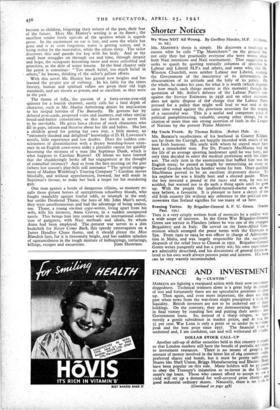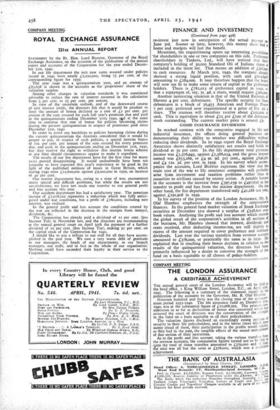FINANCE AND INVESTMENT
By CUSTOS
MARKETS are fighting a rearguard action with their now cu,--omarY doggedness. -Technical trimness alone is 'a great help in reriods of test and fortunately there are no speculative positions t., clear up. Then again, and even more important, the days are long past when news from the war-front might precipitate a rt-h for liquidity. British investors are not to be jockeyed out o• their holdings. On the contrary, they are demonstrating the' faith in final victory by 'standing fast and putting their savim into Government loans. So, instead of a sharp relapse, w have merely a gentle subsidence in market prices, and at 1,4 the 3f per cent. War Loan is only a point or so under its w peak and the best price since 5937. The financial f:ont 15 undented and, I am confident, can and will withstand all .,.-tacks.
DOLLAR STOCK CALL-UP Another call-up of dollar securities held in this country rcninds us that London markets still have the benefit of periodic ad' :dons to investment resources. There.is no means of gaugirg the amount of money involved in the latest list of 164 common :0c-ks: preferred shares and bonds, but it must be pretty -subsilti Shares like Shell Union, Briggs Manufacturing and' Electri, Bond have been popular on-this side. Many holders will be IN '';'ared to obey the Treasury's injunction to re-invest in the G van' ment's tap loans. Those who cannot afford 10 accept so -OW yield will set up a demand for well-covered prior charg-'an good industrial ordinary- shares. Naturally, there is no r td (Continued on page 458) •
FINANCE AND INVESTMENT
(Continued from page 456) re-invest just now in anticipation of the actual pay-out ea June 3rd. Sooner or- later, however, this money must find a home and markets will feel the benefit. Meantime, the requisitioning opens up interesting possibilities for shareholders in one or two companies on this side. Preference shareholders in Tankers, Ltd., will have noticed that their company's holding of 30,000 Standard Oil of Indiana shares ii included in the latest list. That means an addition of £207,000 to cash resources. At March 31st, 1940, the company already showed a strong liquid position, with cash and gilt-edged amounting to £284,000. It may therefore happen that the board will now see fit to make some return of capital to the preference holders. There is £782,015 of preference. capital in issue, so that a repayment of, say, 3s. 4d. a share, would require £260,000. Another interesting situation is that of the United Railways of Havana 4 per cent. debentures. The specific security for these debentures is a block of 36,453 American and Foreign Power 7 per cent, preferred now requisitioned at a price of 87s. Id. a share. The trustees will therefore receive about £150,000 in cash. This is equivalent to about £12. per £m° of the debenture stock outstanding. The current market price is around £9.
GOOD INSURANCE DIVIDENDS
In marked contrast with the companies engaged in life and industrial insurance, the offices doing general business are demonstrating their ability to Weather war difficulties without reducing their dividends. In its 1940 report the Royal Exchange Assurance shows distinctly satisfactory net results and holds in dividend at 30 per cent. In the life department total premium income was £1,376,945, against £1,388,034, and the gross interest earned was £653,266, or £4 9s. 9d. per cent., against £646,561 and £4 125. 3d. per cent. in 1939. In his survey which accom- panies the accounts, Lord Bicester expresses the view that the main cost of the war to life assurance companies will probably arise from investment and taxation problems rather than in casualties to civilians caused by enemy action. A notable feature in the accounts is the increase from £397,159 to £497,658 in the transfer to profit and loss from the marine department. On the other hand, the fire department transferred only £41,288 last year against £191,908 in 1939. In his survey of the position of the London Assurance, Mr. R. Olaf Hambro emphasises the strength of the corporation's finances. In the general fund market valuation of Stock Exchange securities at December 31st showed a surplus of £258,607 over book values. Analysing the profit and loss account which records the global result of the corporation's activities in all sections d the business, Mr. Hambro showed that interest, dividends and rents received, after deducting income-tax, are still slightly in excess of the amount required to cover preference and ordinary dividends. Last year the various transfers from revenue account amounted to £376,000, or practically the same as in 1939- He explained that in reaching their bonus decision in relation to the results of the quinquennial valuation, the directors had been primarily influenced by a desire to conserve the strength of the fund on a basis equitable to all classes of policy-holders.



























 Previous page
Previous page